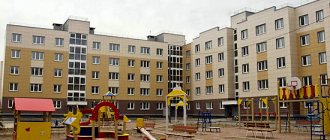PRO new building 7 (499) 703-51-68 (Moscow)
- When renovating common areas. For example, the owner decided to equip a vestibule. Since he is “borrowing” part of the common area, he will need to obtain the permission of all the inhabitants of the staircase.
- When changing the facade of a building. For example, when increasing the area of the balcony or changing the location of the window, as well as when equipping a separate entrance to the apartment.
- When rebuilding the sauzla. For example, if the owner wants to swap the toilet and bathroom, or add a bathroom to the hallway. It should be taken into account that you cannot install bathrooms above living rooms, even if the neighbors do not mind.
- When combining an apartment and an attic space , that is, turning the apartment into a two-level one. The attic is a common area of the house, so it is necessary to obtain the consent of all owners of the house, as well as the management company.
How to obtain the consent of the residents of the house
When obtaining the consent of neighbors for redevelopment, take into account the following points:
- It will have legal force only if the person who gave it is an adult;
- Those citizens who are not apartment owners, for example, living as tenants, do not have to sign the permit;
- When carrying out redevelopment in a communal apartment, it will be necessary to obtain the consent of all residents of this living space.
Ways to carry out such an action can be:
- Absentee voting . Written consent of each person acting as the owner of the apartment. Obtaining such a document by visiting neighbors, informing them of plans for redevelopment, demonstrating a plan or sketch of what is planned to be implemented and directly obtaining consent;
- In-person voting . Permission, provided that the document is certified by a notary. It is filled out at the general meeting of residents. This option is most convenient to use if you need to obtain consent from all residents of the house at once. It is more acceptable when it comes to affecting the territory that applies to everyone living in an apartment building, for example, the attic;
- In-person and absentee voting . It involves the owner of the apartment visiting the general meeting to familiarize themselves (discuss) with the issues put to vote, but the decision is made remotely, by sending their decision to the agreed address or place, before the specified deadlines specified in the notice of the meeting.
The consent of the residents, adopted at a meeting of the owners of the house, is drawn up in the form of a “Protocol”, which has legal force and must be submitted to the Housing Inspectorate when carrying out redevelopment or re-arrangement of the residential premises. When conducting absentee voting, the written consent of each owner must also be attached to the list of documents for registration of changes in the layout of the apartment.
When voting at a general meeting of residents on the issue of making changes to the common property of the owners, the decision made is considered sufficient after receiving the consent of the majority of votes (meeting participants), provided that no less than 2/3 of all apartment owners of the apartment building participated in the voting itself . Any of the permission forms used are drawn up in two copies - one is given to the person who intends to carry out the redevelopment, the second remains with the management company as confirmation of legality.
Obtaining consent for apartment redevelopment
- dismantling and changing the location of partitions of load-bearing structures;
- changing the location of door openings and their arrangement (in load-bearing structures);
- increasing or decreasing the number and size of rooms in multi-room apartments;
- equipment of additional kitchen rooms or bathrooms;
- increasing living space by reducing the size of auxiliary rooms;
- reconstruction and installation of vestibules;
- arrangement of entrances to kitchens through living quarters.
Coordination after the fact
Don't worry, everything can be legalized. The first thing you will have to find out after the redevelopment has been completed is whether all the work was carried out in accordance with SNiPs, SanPi-nam, PTB, VSN, TSN and other governing documents.
If you receive the appropriate technical reports, the redevelopment will be legalized. The package of documents will be standard, new measurements will also be made, and all changes will be made to the documents from the BTI.
Paragraph 3 of Article 29 of the Housing Code of the Russian Federation states that the owner of a residential premises that has been unauthorizedly rebuilt or redesigned, or the tenant of such residential premises under a social tenancy agreement, is obliged to bring such residential premises to their previous condition within a reasonable time and in the manner which is established by the approval body.
Paragraph 4 states that, based on a court decision, residential premises can be preserved in a rebuilt or redesigned state, if this does not violate the rights and legitimate interests of citizens, or does not pose a threat to their life and health.
Application for redevelopment of an apartment
Application for redevelopment of an apartment. is an official appeal by several persons or one citizen to an official, a state body, the administration of an institution or a local government body in relation to an apartment. An application, unlike a complaint, is not related to a violation of his legitimate interests and rights and does not contain a request to eliminate such a violation, but is aimed solely at realizing the interests and rights of the applicant or eliminating any shortcomings in the work of enterprises, organizations, institutions. Applications can be submitted either orally or in writing. The procedure for their consideration is similar to how complaints are considered.
Structure of written consent
Only the owner of the apartment, whose rights have been officially confirmed, can obtain permission for redevelopment. If a person uses an apartment on the basis of a social tenancy agreement, then its official owner is the municipal administration.
In this case, the employer is not given the authority to collect written consents. This is within the competence of the municipal authorities, who still need to be convinced of the need for redevelopment.
It is advisable for the owner of the residential premises to prepare a written consent form in advance so that neighbors do not have to waste time writing it. The document is drawn up in any form, but it must include the following points:
- Full name of the neighbor (written in the genitive case along the upper right edge);
- applicant's registered address;
- place of document preparation (city/town);
- name of the document: “Consent for redevelopment”;
- address of the apartment in which the redevelopment will take place;
- date of signing the consent;
- signature and transcript of the neighbor's signature.
In the main part you need to write down the following information: “I give consent to carry out work on the redevelopment of the apartment located at the address “….” according to the redevelopment project provided by the owner of the residential premises.”
The document has a simple written form and does not require mandatory notarization.
In order to obtain the consent of neighbors for redevelopment, you need to let them familiarize themselves with the following documents:
- a valid technical passport;
- a sketch of the redevelopment project, which indicates the planned changes;
- a redevelopment project developed by a specialized company that has permission to provide this type of service;
- permission from the management company, SES and fire inspection (optional).
A sample consent of the owner or neighbors for the redevelopment of an apartment in Word format can be downloaded from
link
.
Thus, the consent of the owners or neighbors for redevelopment must be obtained if the repair work affects common areas and common property, or is planned to be carried out in a communal apartment. Consent is provided in writing.
Dear readers, each case is individual. If you want to find out how to solve your particular problem, call :
- Moscow: +7 (499) 350-8059.
- St. Petersburg: +7 (812) 309-9401.
Or on the website. It's fast and free!
https://www.youtube.com/watch?v=6eKl-wxL5l8
If the living space belongs to a person as property, then he has the right to do any manipulations with it. He can also carry out redevelopment. If these changes do not violate the rights of neighbors, then they must be coordinated not with those who live nearby, but with representatives of the Housing Inspectorate.
Only experts can assess whether the changes made will affect the living space and its technical characteristics. Official consent may be required from neighbors only if the layout of a communal apartment is changed or if the changes affect common property in an apartment building.
Sample consent of owners for redevelopment of an apartment or non-residential premises
- the owner’s consent must necessarily indicate confirmation that the other owner was previously notified of the planned renovation work and does not express any objections to the other owners of the apartment carrying it out;
- the owner’s consent to carry out repair work must be formalized through a notary;
- in the vast majority of cases, the procedure for obtaining the owner’s consent is carried out on the day of application, while the cost of providing this service will directly depend on what tariffs are set by a particular notary office;
- there is no validity period for this document, unless its text states otherwise;
- the need to obtain the owner’s consent to carry out redevelopment is required in order to subsequently coordinate repair work with the relevant city authority.
Sample consent from a neighbor for the reconstruction of a private house
Necessary documents As noted above, the circumstances and depth of redevelopment may be different and in each case the package of documents is different. But there is a general list of papers needed for any option:
- Application for redevelopment.
- Documents for ownership of residential premises: certificate of ownership, lease agreement, lease. If the premises are rented for social rent or rented, then the consent of the owners is attached
. This could be a municipal authority or the owner and his family. This document reflects the act of consent to the proposed restructuring. - Documents from the BTI, the main one of which is the registration certificate.
- Written consent of other persons living in the housing who have reached the age of majority.
- Consent of the housing commission, HOA.
- Project documentation.
It is additionally important to determine its location, since the location of various buildings too close to the neighboring territory is not allowed. These standards include:
- if a private residential building is being built, it must be located next to the border with the neighboring plot at a distance of more than three meters;
- when constructing any outbuilding, the distance between it and the neighboring site must be more than one meter;
- if a toilet or sauna, bathhouse or compost pit is being built, then they must be located at a distance of more than 8 meters from the neighboring territory.
To determine the distance, it is necessary to take measurements, for which the starting point is taken from the base of the building, and only in its absence can the distance from the wall of the building be measured. If the owner does not live at this address, then you can look for him yourself. This task can easily be delegated to representatives of the land management organization
. They will quickly find the owner of the neighboring plot through the Rosnedvizhimost database.
If the database does not contain information about the owner of the site, then you can legally publish an announcement in the local print media about the approval of construction, as well as the necessary boundary work. Be sure to indicate the time and place of the agreement
. If the owner of a neighboring plot does not appear at this event, this is equivalent to giving his consent to carry out construction work.
Registration of consent The neighbors' consent to the construction of a house must be formalized in writing.
https://www.youtube.com/watch?v=BkuKUt-HIeI
Redevelopment of an apartment is a change in the original layout of the premises, which is reflected in the BTI floor plan for your apartment. But in order to change the layout, your desire alone is often not enough
.
Carrying out redevelopment, as a rule, affects not only your own interests, but also the interests of your neighbors, and may threaten their safety, comfort and convenience of living
.
Therefore, in some cases, in order to carry out repairs and change the layout of your apartment, in addition to the basic documents, you may also need the consent of your neighbors for redevelopment .
However, consent to redevelopment may be required not only from neighbors - if your apartment is under a mortgage, then we will also talk about the bank’s consent to redevelopment, because the apartment is its property. In this article we will talk about cases in which you need to obtain consent for redevelopment and how to do it.
Additional documents will also be required if you purchased an apartment with a mortgage. In addition to the list of documents required by law for approval of redevelopment, you will also need written consent for redevelopment from the bank that issued your mortgage loan. Even if the apartment is not yet your full property, this does not deprive you of the right to make your stay more convenient and comfortable
. And if the mortgage agreement does not contain a clause prohibiting redevelopment, then in most cases the bank meets halfway and agrees to redevelop the apartment.
Bank consent to redevelopment, photo:
When redeveloping an apartment, the consent of neighbors will be required in cases where you live in a communal apartment. Even if the rooms you occupy are your property, in order to make changes affecting common areas - hallway, kitchen, bathroom - you will need to obtain the consent of your neighbors for the redevelopment
. Let's say that during the redevelopment process you need to move the door leading from the corridor to your room - such changes will allow you to plan the interior of the room in a more interesting way.
In this case, before starting work on moving the doorway, you need to obtain written consent from the neighbors for the redevelopment. Without this document, the Housing Inspectorate may refuse to approve the work, even if all other documents required for approval of changes are drawn up in the form established by law.
Currently, the information indicated above has been updated and the owners of space in a communal apartment or dormitory do not have the right to remodel even those premises that do not belong to common property.
In all other cases of redevelopment (which happens more often) of premises, you will not need consent for redevelopment from your neighbors. If you live in a separate apartment, then even if you are not the owner of the apartment, if the redevelopment affects only your internal premises, approval takes place in the usual manner established by housing legislation.
Sample consent of the second owner for redevelopment
However, you can engage in coordination either independently or with the help of intermediaries. If you do not have enough time to coordinate the redevelopment on your own, then all issues related to obtaining permits can be entrusted to specialists from intermediary organizations
.
In this case, after issuing a power of attorney to approve the redevelopment, issues related to the collection of documents will be taken over by the specialists of the company you have chosen
. Their responsibilities will include not only collecting documents, but also writing an application for redevelopment in the established form, as well as, if necessary, obtaining consent for redevelopment from neighbors or the bank in accordance with the established sample of consent for redevelopment.
tel. 272-262, 286-997
More often than not, citizens do not always have good relations with their neighbors, and when planning repairs associated with redevelopment , we think: is it necessary to obtain the consent of neighbors for redevelopment. In most cases, this is impossible to do; there may be many reasons for this, from unfriendly relations to the inability to obtain their consent due to their banal absence. Below we will clarify in which cases it is necessary to obtain written consent from neighbors for redevelopment :
1. If the redevelopment is carried out in an apartment that is your property, then the consent of the neighbors for the redevelopment is NOT REQUIRED
. This is due to the fact that you are carrying out redevelopment in an apartment that belongs to you by right of ownership, and by carrying out work in it, you in no way affect the rights of your neighbors.
This is defined in Article 26 of the Housing Code of the Russian Federation, which states that redevelopment and reconstruction of residential premises are carried out in agreement with local authorities. There is also a list of documents required for approvals.
. There is no consent from the neighbors.
In this case, all that is required is the consent of all homeowners; only after this can all work be carried out in strict accordance with the approved plan. 2. If you are carrying out redevelopment in a communal apartment, then it is mandatory to obtain the consent of neighbors for redevelopment
.
In a communal apartment, shares can be allocated as 1/2, 1/3, etc., or can be separate rooms in the apartment. However, regardless of the method of allocating space in an apartment occupied by the owner, redevelopment may affect the rights of neighbors
. Therefore, in this case it is necessary to obtain written consent from neighbors for redevelopment.
3. The consent of neighbors is also required if your redevelopment is related to the reconstruction of the house (the facade is affected). An example is the addition of a balcony, which is increasingly being done by residents of the first floors in order to increase their living space.
So, are you thinking about remodeling your apartment? Or have you already rescheduled it? Do you want your actions to be legal? will help you solve this problem, 272-262! Always happy to help.
If you have any questions, you can sign up for a free consultation on remodeling your apartment. Call now, 272-262!
Admin
Website: opsp.ru
Specialist
You might be interested in:
Conversion of premises into a hairdressing salon
So, you have decided to transfer your apartment to a non-residential building for a hairdresser. Your apartment meets all the requirements for transfer specified in Article 22 of the Housing Code of the Russian Federation, but you need... […]
Negative consequences of unauthorized redevelopment
Homeowners who carry out renovations in an apartment related to redevelopment are required to have permission for redevelopment. Responsibility for unauthorized redevelopment is determined by administrative... […]
Redevelopment and design are not the same thing
The owner of the apartment decided to make a renovation with redevelopment, turned to the designers, they prepared a design project, according to which the renovation was carried out. But a problem arose:... […]
Conversion to a grocery store
Do you want to open your own business, or are you thinking about your own grocery store? To do this, you can buy land and build a store or use an existing apartment,... […]
Is it possible to sell a house without documents?
First of all, in order to sell real estate, it must be owned by the seller. According to the current legislation, rights to real estate are subject to registration in a single... […]
About company
Design, construction and full legal support of the entire process.
Contacts how to contact us?
Omsk, Karl Marx Ave., 34A, 1st floor 272-262, 286-997, 8-800-500-87-70
Subscription to interesting articles about construction and renovation
Thank you! You have subscribed to the news. We will send you only relevant, interesting information.
If the living space belongs to a person as property, then he has the right to do any manipulations with it. He can also carry out redevelopment
. If these changes do not violate the rights of neighbors, then they must be coordinated not with those who live nearby, but with representatives of the Housing Inspectorate.
Only experts can assess whether the changes made will affect the living space and its technical characteristics. Official consent may be required from neighbors only if the layout of a communal apartment is changed or if the changes affect common property in an apartment building.
Apartment redevelopment: where to start with paperwork? Whose consent is required?
- Glazing of balconies equipped with fire escapes. In addition, you cannot dismantle the fire escape located on your balcony.
- Transferring heating radiators to the balcony and installing heated floors using the house's communications.
- Demolition of the window sill block, load-bearing partitions and threshold when combining the balcony with living quarters.
- Installation of a fireplace in a panel house.
- Demolition of load-bearing walls, as well as the installation of openings in them, as well as the installation of openings, arches, and niches in them.
- Transfer of the bathroom to premises located above the living area of neighboring apartments.
- Combining a kitchen with a gas stove with a living space.
We recommend reading: Why paternity can be deprived
Redevelopment of a communal apartment without the consent of neighbors
Sometimes circumstances develop in such a way that not all people living next door in a communal apartment agree with the changes. Even if the redevelopment applies exclusively to one room where the initiator of the changes lives, it will still not be an exception. Many people try to circumvent this rule in this case.
However, in the housing inspection, such consent for cases with a communal apartment is a mandatory requirement. Therefore, employees of this body have the right to refuse to consider such applications altogether. The courts make the same reasoned decision. However, the courts refer to the fact that they are not authorized to deal with issues related to redevelopment.
An even more wrong decision is to first carry out the redevelopment and then try to legitimize it. In practice, most of these cases end not in favor of the person who wants to redevelop the premises. These people end up being a double loser, because the authorized bodies most often oblige them to return the original condition at their own expense.
Consent of neighbors for redevelopment of non-residential premises - sample
This consent is drawn up not in the form of a statement, but in the form of a protocol. It records the address of the house with non-residential premises that are going to be redeveloped.
In this case, a vestibule door is installed, so its characteristics are indicated. A list with residents and their corresponding signatures is entered in the form of a table. Separately, you need to think about adding a phrase about joint payment for such an installation.
Contents of consent
Consent is drawn up in free form. This document should contain the following information:
- Neighbor data.
- Date and signature.
- A phrase about consent (something similar to “I give my consent to the redevelopment”).
- Full name of the applicant (the one asking for consent).
- Registration address and apartment address.
All of the above is relevant for ordinary consent, but not for the minutes of a meeting of residents. In the latter case, you must act in strict accordance with the law, including drawing up a protocol.
This is usually done by the person in charge of the house or a person designated as such.
Document preparation
Permission from neighbors to redevelop an apartment can be obtained as a result of a positive decision at a general meeting of all homeowners (members of the housing cooperative) or after individual agreements with each apartment owner. It is allowed to draw up both a collective permit and separate individual consents of each owner.
The document is considered valid and has legal force if it is signed by all necessary neighbors and all mandatory conditions are met during its execution. Owners of their own plots need to obtain building permission only from those neighbors whose interests will be directly affected by construction.
Owners of their own plots need to obtain building permission only from those neighbors whose interests will be directly affected by construction. To draw up and formalize the consent of neighbors in most cases, it only takes a few minutes of conversation with neighbors and following the instructions described above for drawing up the document. Additionally, the document requires certification by a notary.
Redevelopment of residential premises located in an apartment building, regardless of what type it is, is permitted by law. At the same time, depending on the number of floors, the materials used by the builder, the wear and tear of the building, the floor where the apartment is located - some types of work can be carried out, but others cannot. Redevelopment should be understood as a complex overhaul, which should change the configuration of the room, the functional purpose of the rooms, so communications will certainly be affected.
Dear readers! The article talks about typical ways to resolve legal issues, but each case is individual.
If you want to find out how to solve your particular problem, contact a consultant (St. Petersburg). APPLICATIONS AND CALLS ARE ACCEPTED ROUND THE CLOCK AND SIX WEEKENDS.
It's fast and FREE! It is possible to change the general areas and parts of structures, but this is due to some features. To begin with, the apartment owner must understand that the legislator requires obtaining permission to carry out construction work in the apartment itself, and for this it is necessary to prepare a project. The work must be carried out strictly according to the project, and already at the initial stage, designers can offer the owner only a list of permissible changes.
But they still need to be agreed upon with the Housing Inspectorate and the Interdepartmental Commission (IMC), other regulatory authorities (SES, Ministry of Emergency Situations, Energonadzor, gas industry, etc.).
d.). There is a list of common property that can be affected by the owner when redeveloping his premises, for example:
- building facade, balcony slabs, floors and load-bearing walls;
- transformer booth, heat transfer point, communal garage or parking lot, children's playground;
- other.
- attic, roof, basement;
- engineering networks and communication nodes;
- a plot of land that includes landscaping and landscaping elements located on it;
- landing, staircase, corridor;
Sample consent of neighbors for redevelopment







